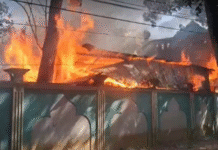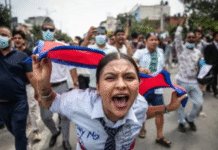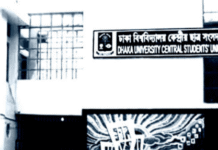
Governments of South Asian countries have become more authoritarian during the coronavirus pandemic and the crisis is shrinking the field of independent journalism in the whole region, speakers said at a webinar discussion today on media advocacy.
They also said new laws and regulations are being formulated in these countries to stop any criticism of the government.
Titled “State of Media in Nepal during the Covid-19 Crisis and Beyond”, the programme was organised by ARTICLE 19 South Asia and Media Advocacy Group (MAG) Nepal on Tuesday.
Participants included Hari Bahadur Thapa, former editor of Nepal’s daily Annapurna Post, Govinda Acharya, president of the Federation of Nepali Journalists (FNJ), and Prakash Rimal, former editor of The Himalayan Times, while Faruq Faisel, Regional Director of ARTICLE 19 South Asia, chaired the event.
Babita Basnet, Editor of Nepal’s news media Ghatana ra Bichar and Executive Director of MAG Nepal, moderated the discussions.
Speakers at the discussion said restrictions on movement and added risk of the health crisis has affected the media sector in the region, leaving journalists vulnerable.
With the lack of social safety nets and absence of economic infrastructures, the governments in South Asian countries have failed to provide proper assistance to the media sector, which has largely been left neglected, they also said.
In Nepal, media houses have been severely affected as advertisement revenues have gone down by nearly 80% on average. According to FNJ, 107 journalists have been infected by Covid-19 till date and almost 600 newspapers have closed along with seven radio stations in the region.
Additionally, more than 2,000 media workers have been laid off and at least 50% of the journalists currently working are not getting regular salaries.
With the crisis of livelihood, journalists are also struggling to get reliable and accurate information regarding Covid-19 and related issues, said the speakers.
Speaking at the event, Faruq Faisel said, “The Covid-19 situation has put the media industry in Bangladesh and Nepal in a similar crisis. A holistic assessment on current situation of journalism and the media sector is essential to fit in and sustain in the new normal.”
He also said focus should be more on shifting to digital media and new media, as well as research based investigative journalism and strategies to increase the revenue of media companies.
Hari Bahardur Thapa, former editor of Annapurna Post, emphasised the need to understand the negative influence of investors and owners, who are more business oriented, using unethical tactics to unjustly retrench workers and staff.
He said, “The media industry in Nepal is still young. Most of the investors and owners use the media influence for their own gain. As a result, it is important to safeguard the integrity of the media sector by protecting journalists.”
Prakash Rimal, who recently resigned from his role as editor of The Himalayan Times due to the company’s handling of the crisis and unwillingness to pay their staff, said: “We need journalists to be paid their dues and we need to keep the industry up and alive.”









